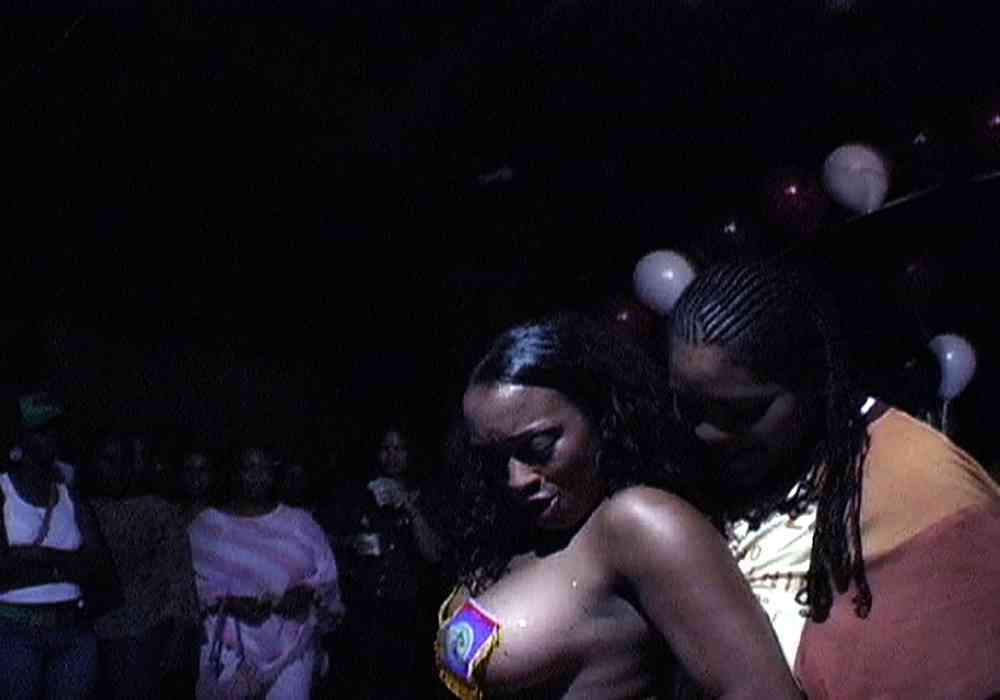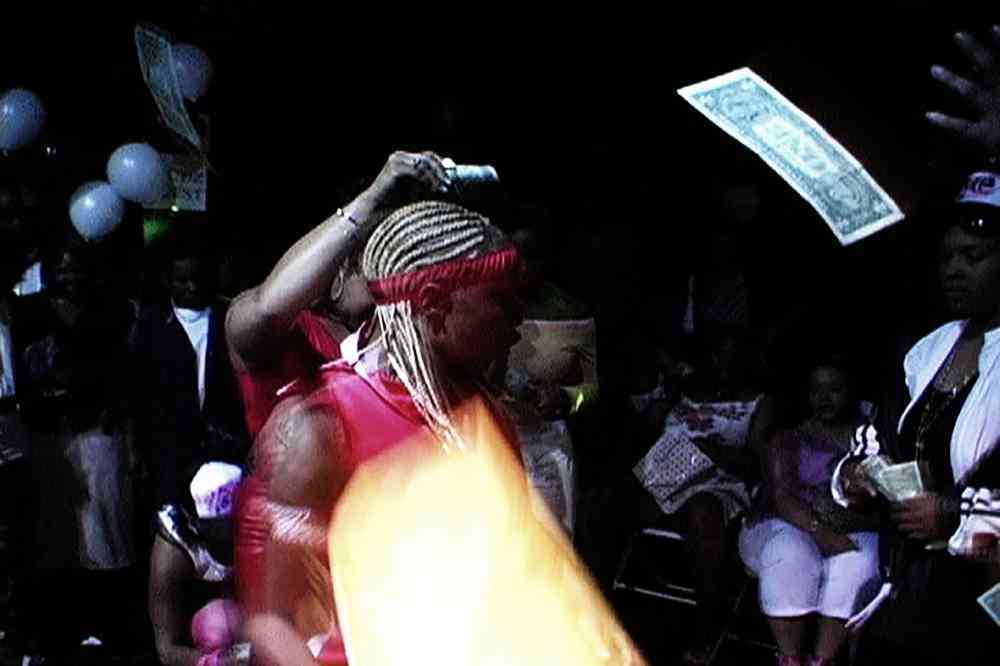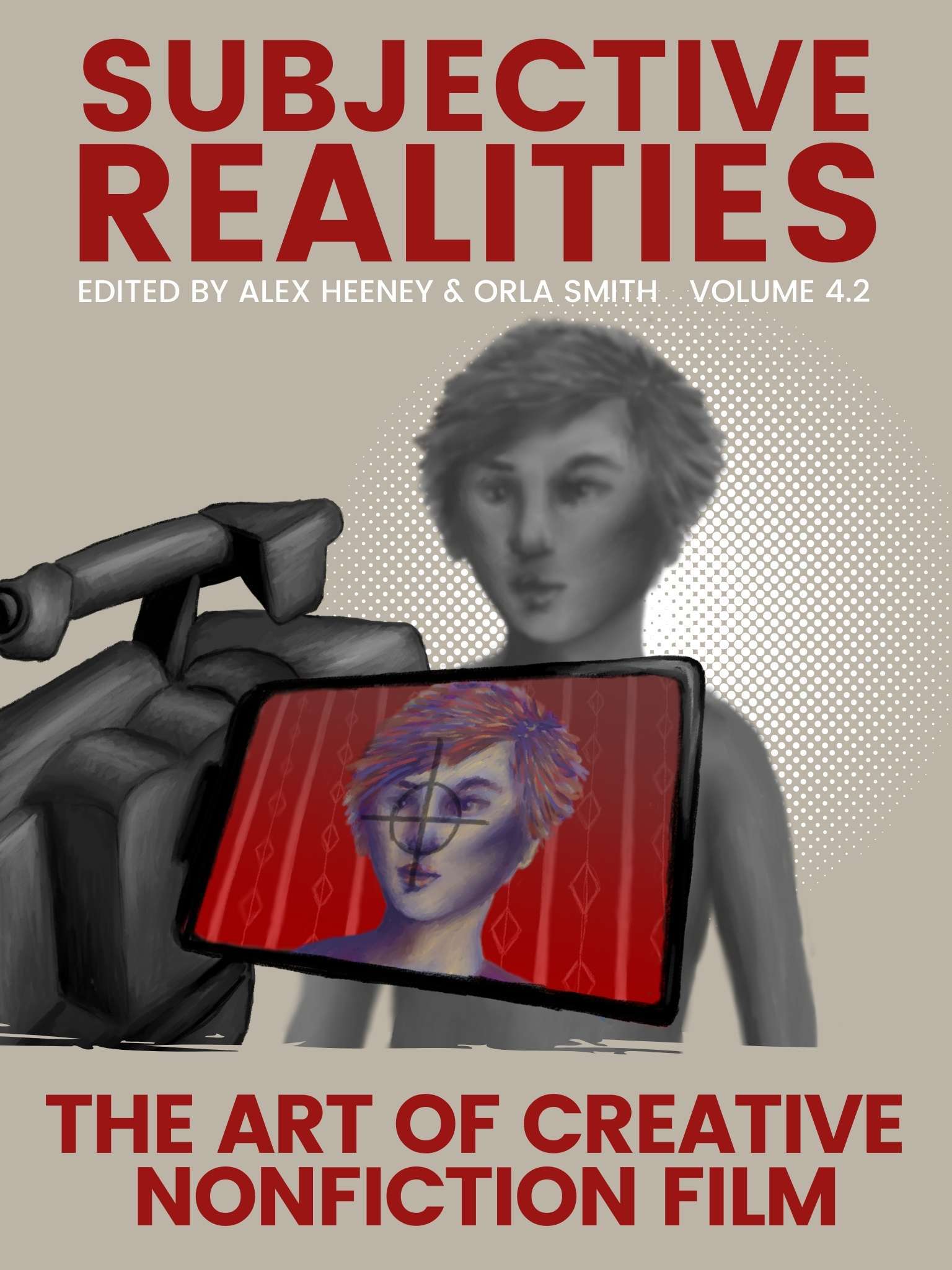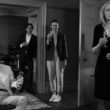Leilah Weinraub discusses Shakedown, waiting for the right climate to release her film on black lesbian club nights, the pitfalls of classic documentary practice, and trusting your audience.

Premiering at the Berlin Film Festival, Leilah Weinraub’s documentary offers a vivid and radical account of Shakedown, a series of Los Angeles underground club nights from the early noughties. Organised exclusively by and for black lesbians, these parties featured the Shakedown Angels, a group of lap dancers whose explicit and energetic performances involved direct contact with spectators and a liberating absence of any kind of taboo.
Weinraub’s rare footage is worth seeing as a window into often ignored, marginalised lives and for its unabashed lack of censorship — yet she pushes the project further. With bold editing choices, juxtaposing the low-fi flyers and the gritty footage from the time with a distorted electronic sound design, Weinraub crafts a visceral and intoxicating experience. Rather than othering her subjects and opting for a sensationalistic approach to an underrepresented lifestyle, Weinraub presents Shakedown with the same open-mindedness and shameless hedonism promoted by the club itself — witnessing the joys and pleasures born from such liberation might make you shed a few inhibitions yourself.
I talked to Weinraub in Berlin about her involvement with Shakedown, waiting for the right climate to release the film in, the pitfalls of classic documentary practice, and trusting your audience.
Seventh Row (7R): How did you first meet the Shakedown Angels?
Leilah Weinraub: I originally asked to work at the club. I went there one night, invited by a friend, and I thought it was a spectacular theatre — everyone was so gorgeous, the vibe was so right.
After going to the club, I decided I really wanted to work there. I learned that Ronnie Ron [the woman who created Shakedown, and whom we see in the film] was the owner, so I went and talked to her. She asked me what I could do, and I said I could take pictures. I was doing still photography then, and I thought working there could evolve into a photo series.
I took pictures for a while, but they were these frozen moments that couldn’t capture everything that was happening. There was just too much going on. Photography wasn’t the right medium. Everything [in the] pictures was frozen, but the place wasn’t frozen — it was … I don’t even know what the right word is. Open. And alive.
The first night I filmed, I used a friend’s totally normal camera — I think you can see and feel, in the film, the quality of the image, from this early 2000s video camera, with a flip screen and everything. I filmed with that first; then, I got a better camera. I would tape the shows on Thursdays and Fridays, for as long as the club was open.
People knew me as the person with the camera, so sometimes I would be asked to film other things, like a wedding in Las Vegas, or a baby shower, or some crazy party at a race track. People would just invite me to stuff. It was really awesome. I also would edit stuff for them, and even though it would take me about five days, I would only charge $30! But I was still learning how to edit, how to make films… It was an exchange.
7R: There’s a bit in Shakedown where Ronnie Ron explains that, at the time, she didn’t want too many pictures of the club in magazines because she wanted to keep it underground. How did you deal with that, and what were you doing with the footage at the time?
Leilah Weinraub: I was editing it and sometimes giving it back to whoever was at the party that night. I was open about wanting to make a documentary. It’s taken so long that I don’t think anyone thought that it would ever be finished.
7R: Even at the time, you knew that you wanted to make a documentary about this?
Leilah Weinraub: Yes. And I was working in film already.
[clickToTweet tweet=”‘The classical documentary formula always looks for a problem and a solution. I wasn’t going to do that.'” quote=”‘The classical documentary formula always looks for a problem and a solution. I wasn’t going to do that.'”]
7R: Why did you make Shakedown now?
Leilah Weinraub: It feels like the right climate to release the film in. There isn’t so much explaining to do — it can just exist. So many things have changed since 2003 [when the footage was first filmed], at the beginning of reality TV, before celebrity was democratized. Now, we’re all constantly broadcasting our personal lives. But at the time, people would still ask not to be taped! They’d use their hands to hide their faces from the camera. That never happens anymore! That was also before Obama was president. I think that him being president changed global culture.
I feel like, if you’re making a movie about someone, you have to make the definitive movie about them. So you have to be very conscious about how you’re portraying the person. If you just put a judgment on them as “good” or “bad,” it’s very limiting. With that duality in place, no one can just be who they are. But I believe that, at this point in time, there’s a little bit more of an open door for the film to find its audience, and less pressure to be “right” or “good”. There’s a little more room to just “be.”
I was super protective about the film. When you have an idea, there’s always this thing where all that everyone ever asks you is: “What are you working on?” There’s this pressure to always have a good idea and to rush to publish. But this film was sacred to me. I wanted to make sure that it was released at the right time, in the right way.

7R: There are quite a few explicit images in Shakedown. Did you ever consider cutting them out and toning the film down?
Leilah Weinraub: No. I think that’s the film’s asset. It’s important to see women with each other in this way. What’s in the film is important to see.
7R: Often, documentaries about people who were really famous put the subjects on a pedestal and turn them into legends, as opposed to real people. In Shakedown, we get to see the Shakedown Angels as fabulous stars. But in interviews, they reveal their doubts, how they became angels, and how they learned to shed their self-consciousness.
Leilah Weinraub: This interview process is very important. I was trying to make sure that I was coming from a place that was…cool! And interesting. I was trained in documentary filmmaking about labour, so all my questions were formal questions about labour: “What do you do?” “Describe your work.” “What’s your process of labour?” I was approaching the subjects step by step. “What is your work?” “Do you think it’s work?” “How do you feel about that?”
If you start from a place of shame, where this work they were doing is bad, then of course this is all you’re going to talk about. But that wasn’t in the story, so that’s not where we started.
[clickToTweet tweet=”‘I wanted to use the power of cinema to create a spectacle, but also to show the truth behind the spectacle.'” quote=”‘I wanted to use the power of cinema to create a spectacle, but also to show the truth behind the spectacle.'”]
7R: Shakedown has talking head interviews and archival footage — both trademarks of classical documentaries. But the film is also a visceral experience with a visually rich aesthetic and bold editing that doesn’t follow documentary conventions. How did you decide on that style, and how did you balance those two very different sensibilities?
Leilah Weinraub: My editor’s name is Matt Hollis. We worked very closely together for the past year and a half, maybe a little more than that. There were so many ideas that we were trying to get in there. Although many interviews didn’t make it through, they really inform the rest of the film and how we chose to display every single image. The images are imbued with those interviews. There was a wealth of knowledge and images, so it was very hard to consolidate all that into one movie.
When you make a documentary, you can do a lot of explaining. It could be a didactic film where you break it down by category. But I thought that approach had been done before, and that it wouldn’t be true to the material. I was trying to get away from the classic documentary formula — I think there’s a familiarity with that style that isn’t cool. In that style, you problematize something. There has to be a problem, There has to be someone who comes in and solves the problem, and there has to be a winner and a loser. I was not going to do that. You can fabricate any story in that direction, with a three-act structure, a hero or an anti-hero… I don’t think that’s imaginative.
We had to really turn our minds inside out, try to feel the material that we were working with, and to be true to that. In order to even ask further questions about those people’s labour and life, I think you first need to understand the feeling of the space. So that was the first real objective: to make viewers feel what it was like to be there.
7R: There’s a scene where you’re interviewing Egypt, a former Shakedown Angel, years after the Angels parted. You ask her to read a text that will constitute the voice-over of the film, but you decided to show her rehearsing that reading.
Leilah Weinraub: When I started taking an interest in film, one of the things that I was into was people talking. A lot of the video work that I was interested in was like Paper Tiger TV, a queer video network out of New York. It was really about true vérité cinema, where you are unhinged and you show the process. I wanted to use the power of cinema to create a spectacle, but also to show the truth behind the spectacle.
[clickToTweet tweet=”‘A lot of people today are like, “people have a short attention span,” and I’m like, “a short attention span for bullshit!”'” quote=”‘A lot of people today are like, “people have a short attention span,” and I’m like, “a short attention span for bullshit!”'”]
7R: Has your perception of the time you spent at Shakedown changed since filming?
Leilah Weinraub: This process of opening it up to an audience is like a next level, because they get to be your proxy witness. You get to see the film again through this audience perspective, and it’s completely different.
7R: Talking about how you expect the film to find its audience, how did you think about that when you were making the film? Were you just making the film you wanted to make, or did you try to anticipate what the audience would want?
Leilah Weinraub: People tell me a lot about what they think is commercially viable, what would screen in a theatre, what people would like to see; about nudity, about how you have to edit it out. I think that censor laws have worked, in the sense that, now, people will censor themselves without even being asked.
It’s the same when people think about the space for a work. They also immediately censor. They say, “Oh no, there’s no space for that.” I don’t believe that’s true. I think that audiences are extremely intelligent. I think people are really smart, and really good at watching things.
A lot of people today are like, “people have a short attention span,” and I’m like, “a short attention span for bullshit!” You know? People can watch lots of things for a long time if it’s good! That’s why big budget trailers have to punch you in the first 15 seconds, because the film might not be good enough! I feel like the world is, in reality, really open, even though there are a lot of forces trying to convince us that it’s not.
[clickToTweet tweet=”‘I feel like the world is, in reality, really open, even though there are a lot of forces trying to convince us that it’s not.'” quote=”‘I feel like the world is, in reality, really open, even though there are a lot of forces trying to convince us that it’s not.'”]
7R: Are you planning on making another film?
Leilah Weinraub: Yes, this year. There’s that idea that you think about the same few things for your whole life. I guess the things that I’m thinking about are women, history, the future, and money.
[clickToTweet tweet=”‘It’s crazy to me that people think they are ever not acting.'” quote=”‘It’s crazy to me that people think they are ever not acting.'”]
7R: Still a documentary?
Leilah Weinraub: The binary — documentary vs. fiction — is so crazy. I think those genre distinctions are weird. It’s crazy to me that people think they are ever not acting.


